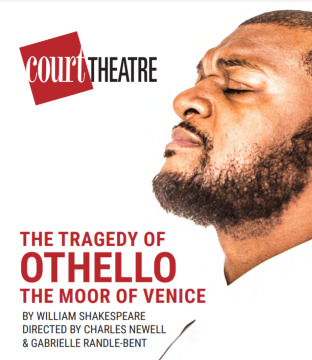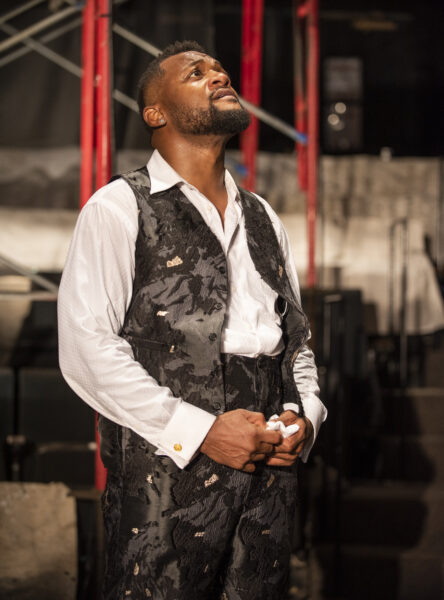IS LESS MOOR?
The Court Theatre artistic management is giving William Shakespeare’s great tragedy Othello a startling makeover. The play has been condensed into a single 110-minute act. The physical and textual results may earn praise from many viewers for their unorthodox exploration of a complex drama. Others, myself included, may admire the risk-taking production that challenges our previous exposure to The Moor of Venice, but still leave the Court feeling the interpretation cost the play more than it offered in fresh insights.
Othello is perhaps Shakespeare’s most direct drama, concentrating solely on the destruction of the title character by the villainy of the malignant Iago. Othello is a Moorish general (for “Moorish” read “black”) in the service of the city of Venice. Iago is his ensign, who secretly hates Othello because he feels the general passed him over for promotion or because he believes Othello seduced his wife. Iago’s real motivation is murky but his hate is genuine.
The sly and persuasive Iago, who has Othello’s total confidence, is fast on his feet in exploiting opportunities to insinuate that Desdemona, the white daughter of a Venetian aristocrat, is being unfaithful to the general. In a rapid sequence of events Iago convinces his master that Desdemona is indeed false and at the end of the play, maddened by jealousy, Othello kills his innocent wife. He then learns of Iago’s perfidy and kills himself in grief.
That the Court has special plans for the play is evident as soon as the spectator enters the theater. The 251-seat auditorium has been reduced to 80 seats. Part of the audience sits on individual swivel chairs on the stage. The remainder occupy sections of permanent seats, the majority of them covered with tarpaulins. The loss of more than two-thirds of the seating capacity must have taking a major bite out of the theater budget. Two levels of scaffolding are installed throughout the theater, giving the production a vertical thrust, with viewers at the stage level rotating on their swivels to follow the physical action.
The adaptation is limited to the key characters in the play: Othello, Iago, Desdemona, Othello’s lieutenant Michael Cassio, and Iago’s wife Emilia. The performers wear a bizarre assortment of costumes, with Desdemona and Emilia in evening gowns throughout. Even though the story moves from Venice to the island of Cyprus, where most of the action takes place, there is no sense of place in the Court adaptation or a sense of time. Newcomers to the drama may at times have problems following the story.
The issue of race is obviously on the minds of Court co-directors Charles Newell and Gabrielle Randle-Bent, but the topic was on Shakespeare’s mind, too, and at the outset of the play the Bard makes clear that the black Othello’s marriage to the white Desdemona does not sit well with the Venetian upper crust.
Ultimately, I had difficulty wrapping myself around the Court presentation. The best parts of the evening belonged to Shakespeare rather than the embellishments of the Court staging. I didn’t find the condensation of the story and the idiosyncratic visual look of the show particularly illuminating, though the handling of Desdemona’s handkerchief, which leads to the lady’s downfall, is deftly done.
But the Court can be congratulated on the excellence of the casting. Kevin Roston, Jr. is a powerful Othello, a great military leader but out of his league in the prejudiced Venetian society of his day. Timothy Edward Kane is chilling in his crafty manipulation of Othello; Iago’s portion of the adaptation has been reduced but he still remains the most important character in the play and Kane beautifully sells the character’s subtly. Amanda Drinkall’s Desdemona doesn’t grab the viewer’s emotions with her downfall but the directors apparently wanted a cool and composed character, which does make sense in Desdemona’s confidence in her husband’s love until it is too late.
Cruz Gonzalez-Cadel is terrific as Emilia, a tough lady who somehow doesn’t catch on to her husband’s plotting until disaster strikes. Sheldon D. Brown is an outstanding Cassio, who, like the other major characters, is taken in by Iago’s villainy. Erik Hellman makes a strong impression in the small but telling role of Rodrigo. Darren Patin (Bianca) and Sean Fortunato (Brabantio and Montano) made credible contributions in smaller roles. The entire cast would be well worth seeing in a full length Othello minus the more extravagant and perplexing directorial emendations. John Culbert (scenery), Raquel Adorno and Gregory Graham (costumes), Keith Parham (lighting), and Andre Pluess (sound) get the major design credits. The degree of their success is in the eyes and ears of the spectators.
photos by Michael Brosilow
The Tragedy of Othello the Moor of Venice
Court Theatre, 5535 South Ellis Ave.
Wed thru Fri at 7:30; Sat & Sun at 2& 7:30
ends on December 5, 2021
for tickets ($56 to $76), call 773 753 4472 or visit Court Theatre
for more shows, visit Theatre in Chicago





